
A re you looking for the latest blogging statistics and trends?
Keeping up with the most recent figures can help you identify gaps in your blogging strategy and give you fresh ideas to try.
In this article, you’ll discover what type of content to include and how often to publish blog posts to rank higher and increase organic traffic when you start a blog.
In This Guide:
Let’s get started!
General Blogging Statistics
How many blogs exist today?
There are over 1.9 billion websites on the internet today. And it’s estimated that over 600 million of them have blogs.
Over 43% of all websites use WordPress as their content management system, and it remains the fastest-growing blogging sites and platform:
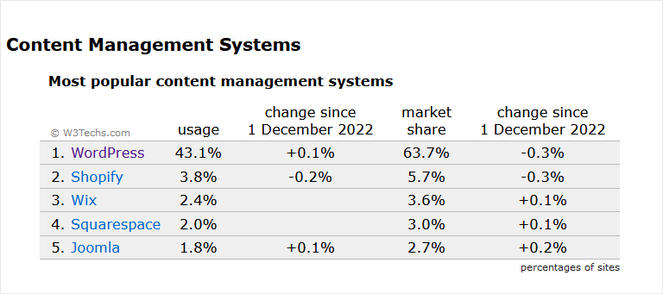
Related: Learn how to install WordPress in easy steps.
How many people are blogging?
According to Statista, the number of bloggers in the United States reached around 31.7 million users in 2020.
ConvertKit found that 69% of bloggers were in the 25-44 age range, and 23% were 45 or older.
How many blog posts are written every day?
More than 2 billion blog posts were published worldwide in 2018. That’s 5,760,000 blog posts per day and 4,000 blog posts per minute.
Want to see the live data? Head over to Internet Live Stats to see how many blog posts have been written today.
Bloggers using the WordPress.com platform produce about 70 million new blog posts and receive 77 million new comments each month.
Blogging Duration Stats
How much time do bloggers spend writing their blog posts?
The Orbit Media Annual Blogging Survey reckons that, on average, bloggers take 3 hours 57 minutes to write a blog post:
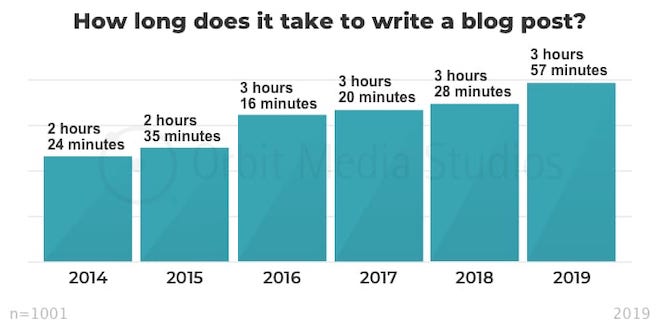
Over the past 5 years, the length of time has increased by 65% from 2 hours 24 minutes in 2014.
Interestingly, bloggers who invest more time per blog post are more likely to report “strong results” than those who don’t:
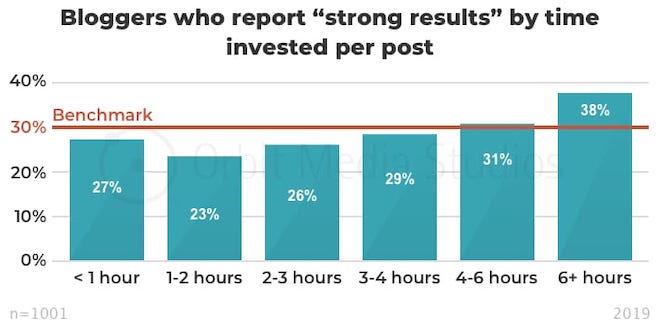
Note: 30% of bloggers reported “strong results” so that’s the benchmark.
Blogging Word Count Stats
Bloggers always want to know how many words they should use in their blog posts.
How long is the average blog post?
Orbit Media says the average blog post is now 1,236 words long, a 53% increase since 2014:
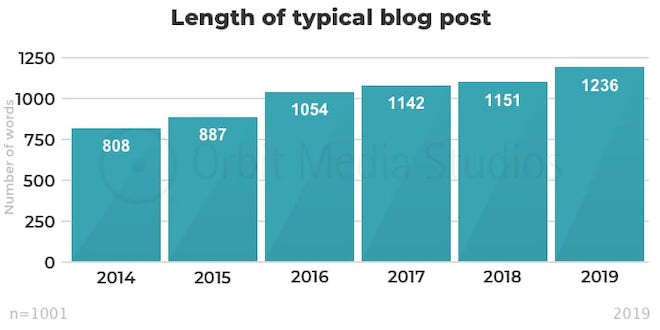
Given that bloggers are spending more time writing blog posts, it’s no surprise that blog posts are getting longer.
While most blog posts fall in the 500-1500-word range, there’s a significant trend appearing with short and long posts:
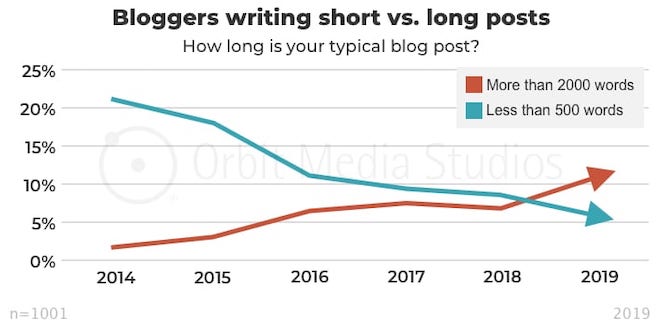
Blog posts over 2,000 words have been steadily increasing, while short blog posts under 500 words have been declining.
Other studies have shown a strong correlation between long-form content and higher rankings.
Backlinko found the average word count of a top-ranked post in Google is 1,890 words:
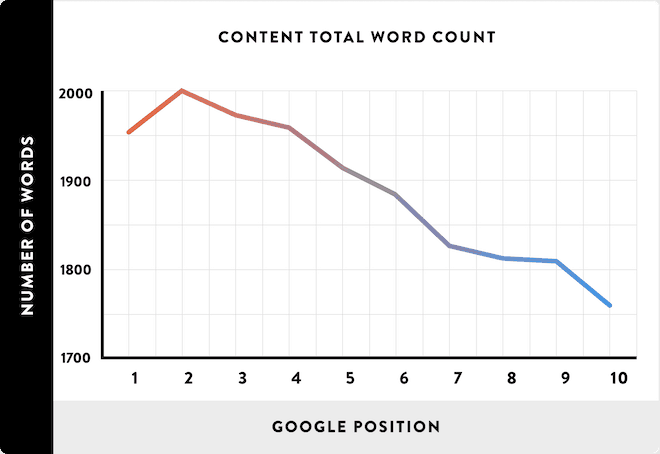
HubSpot’s analysis of their blog posts showed articles with a word count between 2,250 and 2,500 earned the most organic traffic:
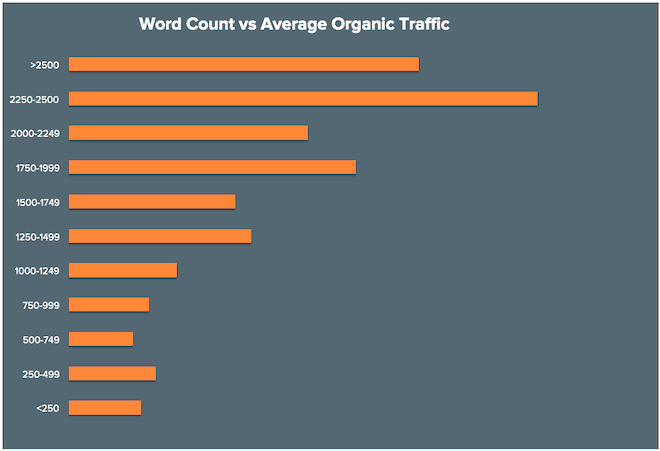
Pro Tip: Remember, these figures are average word counts. While it’s clear to see that longer blog posts get better results, don’t lose sight of quality. We created a full guide on how long your blog posts should be and found it better to have a shorter blog post packed full of useful content than a long blog post full of meaningless words.
Blogging Frequency Stats
A common question many bloggers (both old and new) have is:
How many blog posts should I publish a month?
The latest trends show bloggers don’t publish posts as often as they used to. Whereas they used to publish maybe a couple of times a week, they now publish several times a month.
Again, there’s a correlation that longer blog posts take longer to write, so bloggers can’t publish as many posts as before.
However, the Orbit Media survey revealed that bloggers who do publish daily are more likely to report “stronger results” than bloggers who publish several times per month:
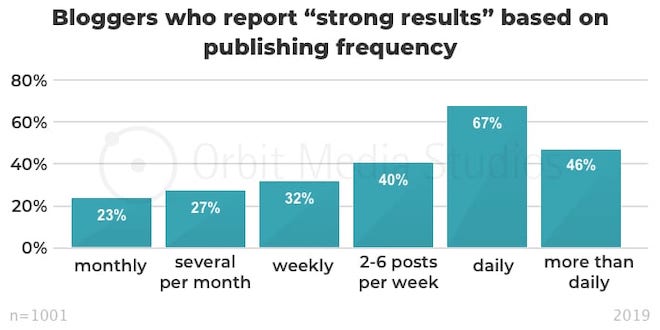
Further statistics from HubSpot show companies who publish more blog posts get more traffic and leads.
And it’s safe to say that publishing more content can help speed up the amount of time it takes to monetize a blog.
- Companies that publish 16+ blog posts per month get nearly 3.5X more traffic than those that publish 0-4 monthly:
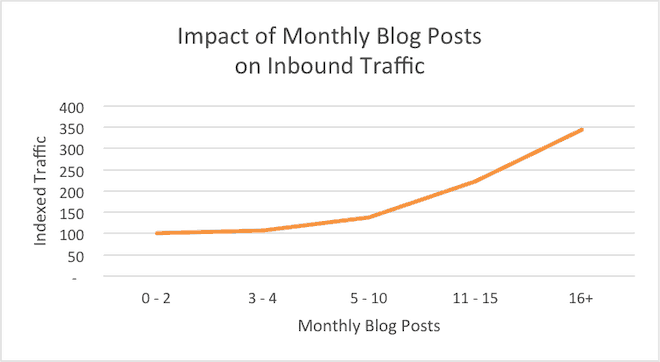
- Companies that published 16+ blog posts per month received about 4.5X more leads than companies that published between 0-4 monthly:
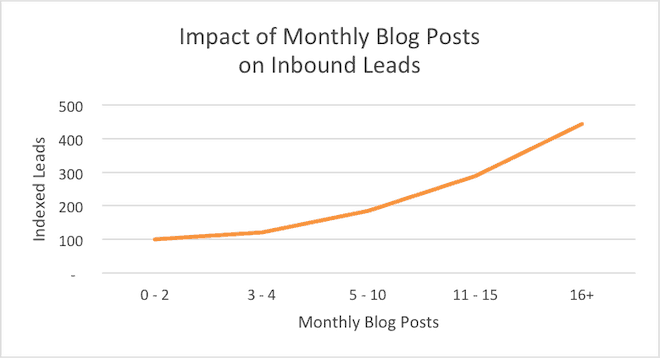
Pro Tip: If you can write longer quality posts and publish them frequently, you can expect more success with your blog.
Blogging Content Stats
We’ve seen that blog posts are getting longer, but which type of content works best?
Orbit Media survey results found “How-to articles” are the most published content format:
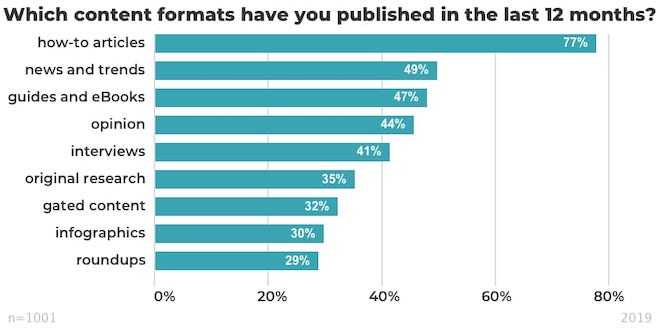
But, when it comes to what works best, there’s a different picture:
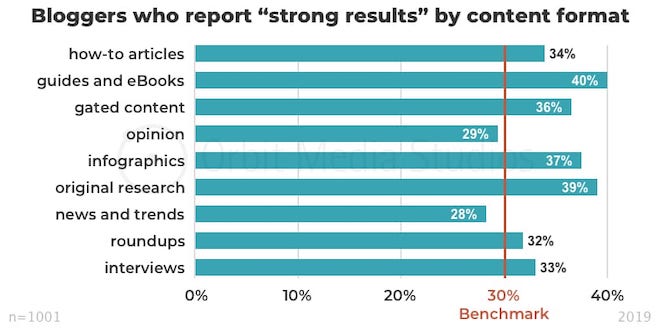
Leading the way are guides, ebooks, original research, and infographics.
Readers like visuals (videos, images, graphs, and stats) in blog posts as it breaks up the text and backs up points you’re making. Adding these elements to your blog posts will improve results:
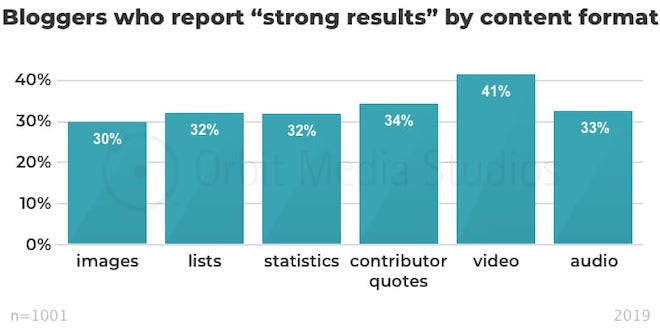
Further stats from HubSpot confirm this:
- Listicles are the most popular blog post format among business blogs.
- Using statistics in blog posts improves consumer trust.
- 36% of people prefer list-based headlines.
And, OptinMonster also has some supporting visual and video stats:
- Articles with images get 94% more views as opposed to those with no visuals.
- 71% of bloggers report using visuals as part of their marketing strategy.
- 19% of bloggers are now including video in their typical blog posts.
Pro Tip: Make sure you have the right content mix in your blog posts.
Blogging SEO Stats
We already touched on some SEO stats, but here’s a few more:
HubSpot found their blog posts with over 2,500 words earned the most links:
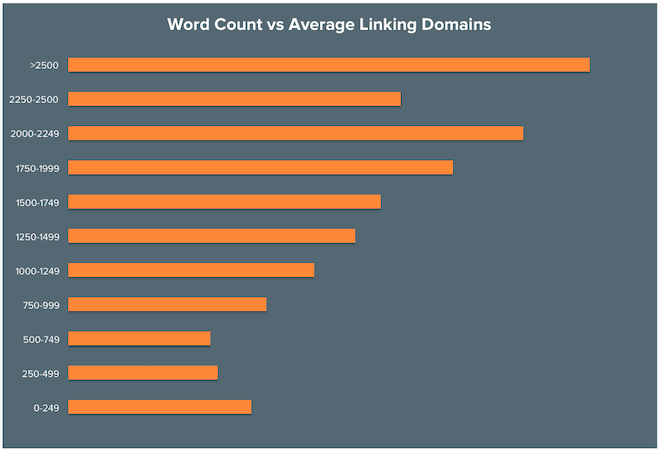
And Backlinko found that the number of domains pointing to a particular page (as well as your overall site) correlated in higher rankings:
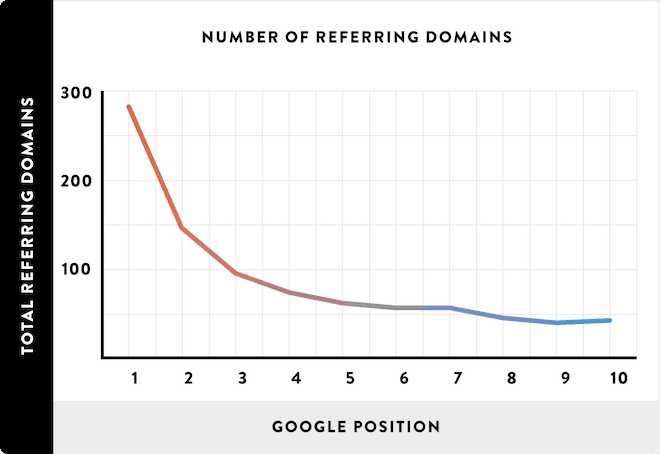
Takeaway: Writing longer blog posts attracts more links. And it’s better to get 10 links from 10 different sites than 10 links from the same domain if you want to rank higher.
Data from AWR shows that almost half of all clicks on the SERPs (search engine results pages) go to the top 3 listings:
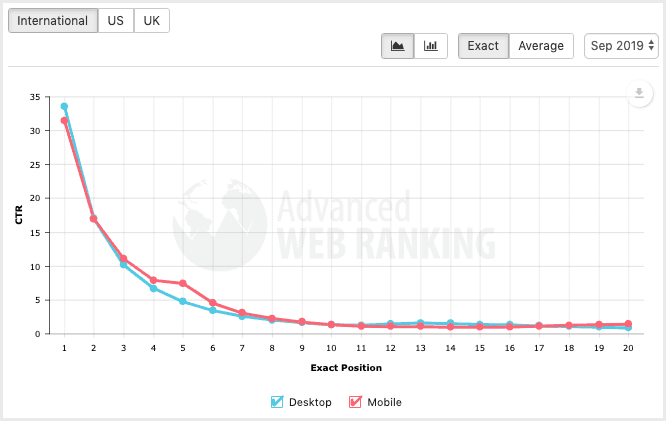
Note: This chart shows the organic click-through rates – desktop (blue) and mobile (red) – for searches coming from 11,762,160 keywords for 108,664 websites in September 2019.
Blogging Traffic Stats
Does blogging bring more traffic to your website?
According to Traffic Generation Cafe, once you publish 24-51 blog posts, blog traffic increases by up to 30%:
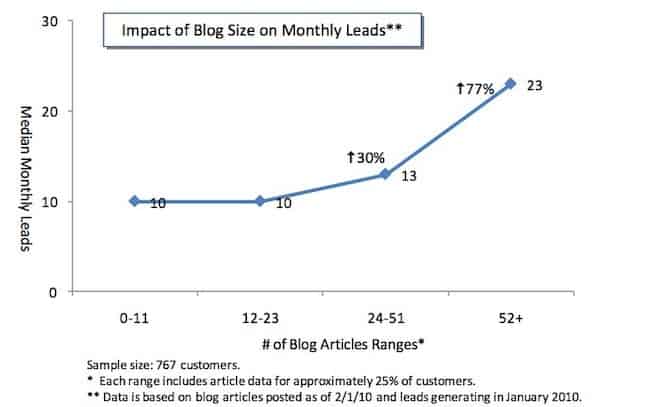
And once you go past 51 blog posts, you can expect a further traffic increase up to 77%.
Publishing quality content consistently helps Google understand what your blog is about, plus readers have a reason to return to your site.
Further research from HubSpot identified what they call “compounding” blog posts, meaning posts whose traffic grows steadily over time:
- 1 in 10 blog posts are compounding.
- 1 compounding blog post generates as much traffic as 6 regular posts combined.
- Compounding blog posts generate 38% of all blog traffic.
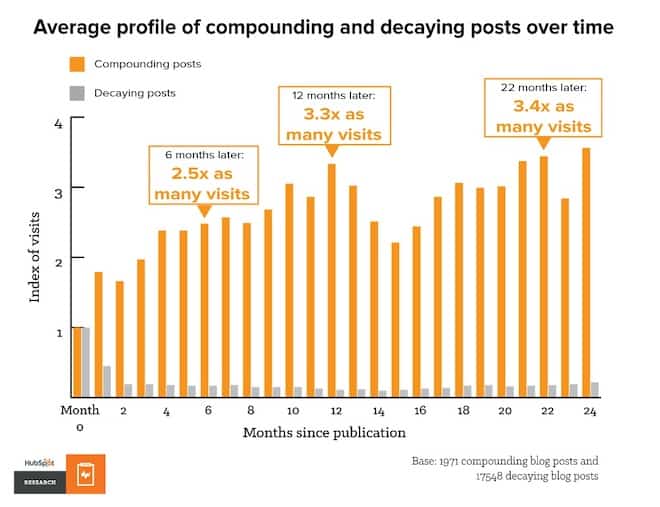
Blog post titles with 6-13 words attract the highest and most consistent amount of traffic.
Guest Blogging Stats
As a blogger, you should make guest blogging a part of your traffic generating activities.
Here are some stats from OptinMonster:
- 60% of bloggers write 1-5 guest posts per month.
- 3% of bloggers write over 100 guest posts per month.
- Only 6% of bloggers publish the majority of their original content as guest posts.
- 79% of editors say guest content is too promotional.
- Guest content is in higher demand in the summer months of June, July, and August.
Blogging Engagement Stats
We’ve seen how blogging improves traffic and rankings, but how do readers rate blog posts?
Readers use blog posts to inform purchasing decisions:
- 60% of people purchase a product after reading a blog post about it.
- 47% of buyers consume three to five pieces of content before making a purchase decision.
Readers prefer organic content like blog posts to sponsored posts:
- 70-80% of searchers ignore sponsored posts in favor of organic content.
- 200 million people installed ad blockers on their computers in 2015.
- Ad blocking in the US has increased from 15%-30% in the last four years.
Readers scan blog posts:
- 73% of visitors skim rather than read the blog post thoroughly – be sure to check out our guide on blog design layouts.
- The average reader only spends 37 seconds reading an article or blog post.
Readers trust and share blog content:
- Blogs have been rated as the 5th most trusted source for accurate online information.
- Blog posts are among the most shared content online.
Blogging Trends for 2024 and Beyond
As you can see from these statistics, blogging is very much alive and still relevant today.
Readers want and trust blog content. As bloggers, it’s our job to deliver the best possible content to answer their questions.
Your content needs to be both entertaining and informative. And as blog posts get longer, you need to include more visuals and videos in your content.
Before you go, why not check out some of our guides to help you start or improve your blog:
- How to Start a Blog – The Definitive Guide
- The Ultimate Blog Post Checklist
- How to Get Traffic to Your Blog
- Ultimate SEO Guide for Bloggers
And as always, if you have any questions, leave them in the comments below.


0 Comments
Join in. The comments are closed after 30 days.